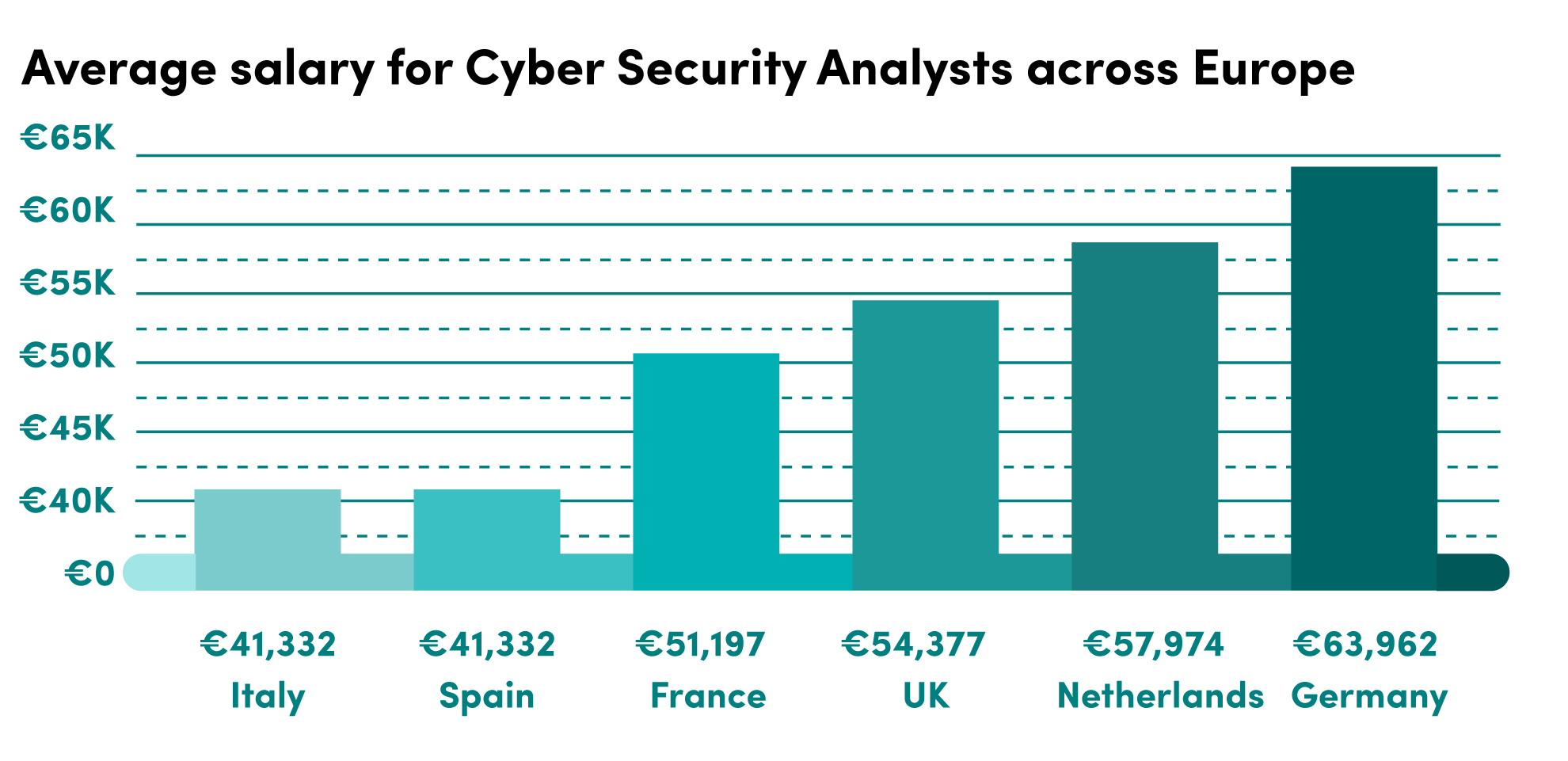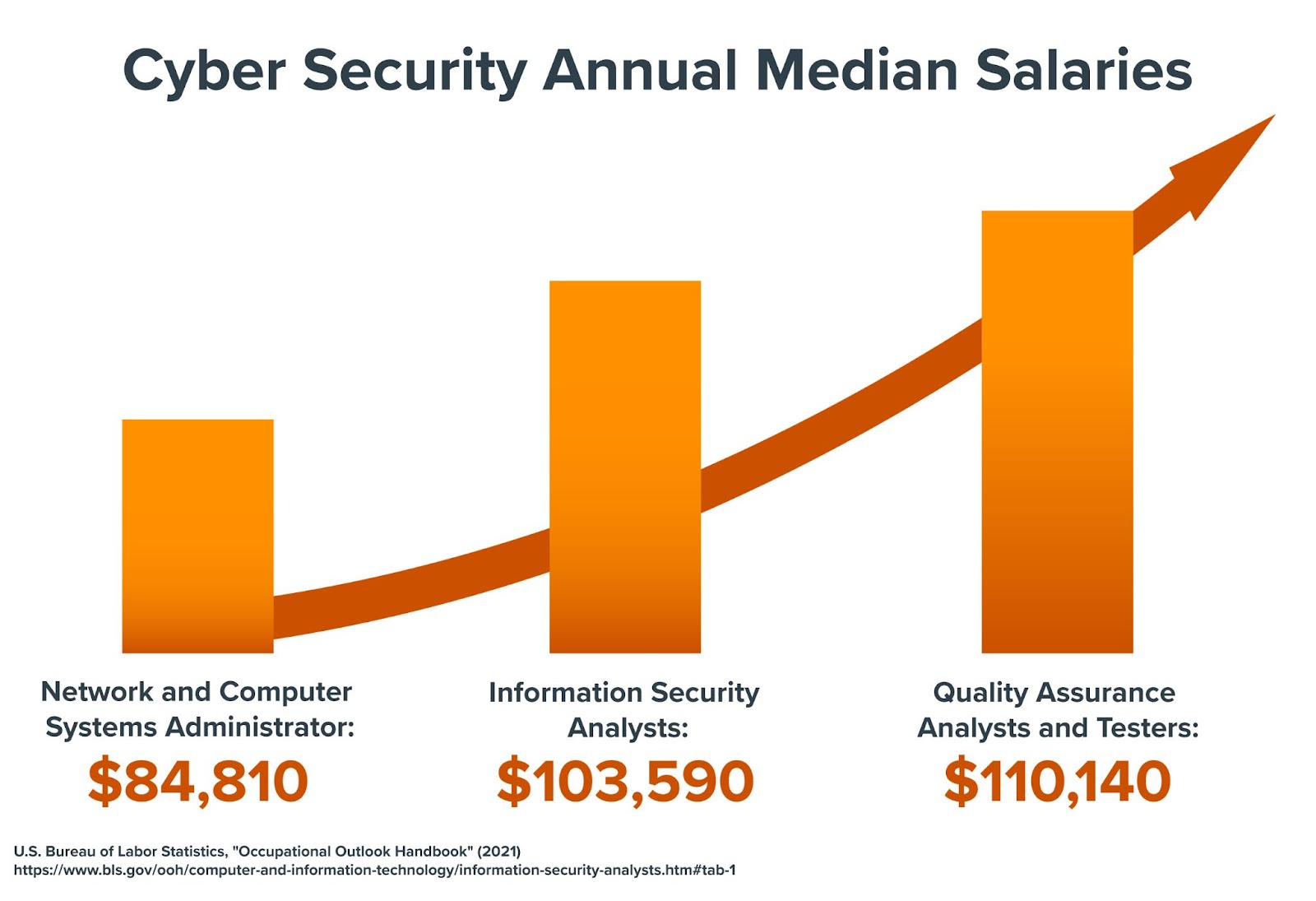
Google Cyber Security Jobs Salary
In today’s Google Cyber Security jobs, salaries are pivotal in safeguarding sensitive information and defending against evolving cyber threats. As technology becomes increasingly integrated into our daily lives, the demand for skilled cybersecurity professionals continues to surge. The Google Cyber Security Jobs Salary includes security analysts, network defenders, ethical hackers, and incident responders.
These professionals are tasked with identifying vulnerabilities, mitigating risks, and responding to cyberattacks to ensure the integrity and confidentiality of digital assets. With the proliferation of data breaches and cyber attacks, organizations across industries are investing in robust cyber security measures, creating ample opportunities for individuals interested in pursuing careers in this dynamic and rapidly evolving field.
importance of Cyber Security Professionals
Cyber security professionals play a crucial role in safeguarding digital assets and mitigating cyber threats in today’s interconnected world. With the increasing reliance on technology in businesses and everyday life, the importance of cybersecurity professionals cannot be overstated.
These experts are responsible for identifying vulnerabilities, preventing unauthorized access, and responding swiftly to cyber attacks to protect sensitive information and critical systems. Their expertise is essential in maintaining the confidentiality, integrity, and availability of data and ensuring the trust and reliability of digital infrastructure.
As cyber threats evolve in sophistication and frequency, the role of cyber security professionals becomes even more critical in safeguarding organizations, individuals, and governments against potential risks and vulnerabilities in the digital realm.

Overview of Cyber Security Salaries
Several factors, including geography, experience, education, and certifications, influence a review of an industry’s Google Cyber Security Jobs Salary. Entry-level positions typically offer salaries ranging from $50,000 to $80,000 annually, with opportunities for advancement as professionals gain experience and expertise.
Mid-level roles command higher salaries, averaging between $80,000 and $120,000 annually, reflecting increased responsibilities and specialized skills. Senior-level positions, including Chief Information Security Officers (CISOs) and Security Architects, often surpass $150,000 annually, along with additional bonuses and benefits.
Salaries also vary based on industry sectors, with technology and finance typically offering higher compensation packages. Furthermore, geographic disparities play a significant role, with major tech hubs and metropolitan areas providing higher salaries to attract top talent. Understanding these salary dynamics is crucial for individuals considering careers in cyber security.
Factors Affecting Cyber Security Salaries
Several factors influence cyber security salaries, including:
Experience
Experience is a crucial factor influencing the Google Cyber Security Jobs Salary. Entry-level positions generally offer lower wages compared to mid-level and senior-level roles. As professionals gain more experience in the field, their expertise becomes more valuable, leading to higher earning potential.
Employers often prioritize candidates with relevant experience demonstrating practical skills and knowledge in handling cyber security challenges. Experienced professionals may also qualify for leadership positions, which typically come with higher salaries and additional benefits.
Additionally, individuals with a proven track record of success in addressing complex security threats may negotiate higher compensation packages based on their past achievements. Overall, experience plays a significant role in determining cyber security salaries and career progression opportunities in the rapidly evolving field of cyber security.

Education and Certification
Education and certification are pivotal factors shaping cyber security salaries and career prospects. Advanced computer science, information technology, or cyber security degrees can significantly enhance earning potential and open doors to higher-level positions.
Similarly, obtaining industry-recognized certifications such as Certified Information Systems Security Professional (CISSP) or Certified Ethical Hacker (CEH) demonstrates expertise and dedication to the field, which can lead to better-paying opportunities. Many employers prioritize candidates with relevant educational backgrounds and certifications when filling cyber security roles, offering competitive salaries and benefits packages as incentives.
Continuous learning and staying updated with the latest advancements in cybersecurity through education and certification programs are essential for professionals aiming to excel in their careers and maximize their earning potential in the dynamic cybersecurity industry.
Specializations
Specializations in cyber security can significantly impact salary potential and career advancement opportunities. Professionals specializing in niche areas such as penetration testing, digital forensics, or cloud security often command higher salaries due to the specialized nature of their skills.
Employers value expertise in these areas, especially as cyber threats become more complex and sophisticated. Technical certifications and training programs further enhance a professional’s credibility and earning potential in their chosen specialization.
Additionally, individuals with niche skills may have access to a broader range of job opportunities and career paths, including leadership roles and consulting positions. By focusing on specialized areas within cyber security, professionals can differentiate themselves in the job market and pursue rewarding careers with competitive salaries and growth prospects.
Industry and Company Size
Industry and company size play significant roles in determining cybersecurity salaries. Industries with high stakes in data security, such as finance, healthcare, and government, often offer competitive salaries to attract top cybersecurity talent.
These sectors are more willing to invest in robust security measures to protect sensitive information and maintain regulatory compliance. Additionally, larger companies typically have larger budgets allocated to cyber security, allowing them to offer higher salaries and benefit packages to attract and retain skilled professionals.
In contrast, smaller companies and industries with lower security risks may offer lower wages for cyber security positions. Understanding the dynamics of different industries and company sizes is essential for cybersecurity professionals when evaluating job opportunities and negotiating salaries.
Entry-Level Cyber Security Jobs and Salaries
Entry-level positions in cybersecurity include roles such as:
- Security Analyst
- Network Security Engineer
- Cybersecurity Specialist
- Salaries for entry-level positions typically range from $50,000 to $80,000 per year, depending on factors such as location and employer.
Mid-Level Cyber Security Jobs and Salaries
Mid-level positions often require several years of experience and may include titles like:
- Security Consultant
- Incident Responder
- Cryptographer
- Mid-level salaries typically range from $80,000 to $120,000 per year, with opportunities for advancement and specialization.
Senior-level roles in cybersecurity include positions such as
- Chief Information Security Officer (CISO)
- Security Architect
- Cybersecurity Manager
- Salaries for senior-level professionals can exceed $150,000 per year, with additional bonuses and benefits.
Cyber Security Salary Trends
Cybersecurity salary trends reflect the increasing demand for skilled professionals to combat digital threats. As cyberattacks become more sophisticated, organizations invest heavily in cybersecurity talent, driving up salaries across the industry.
The demand-supply gap widens, especially for specialized roles like ethical hackers and security analysts. Additionally, the rise of remote work and digital transformation initiatives further escalates the need for robust cybersecurity measures, influencing salary trends positively.
Professionals with advanced certifications and niche skills command premium salaries, reflecting the evolving nature of cyber threats. Overall, cybersecurity remains a lucrative field with promising salary growth opportunities, making it an attractive career choice for individuals passionate about protecting digital assets and ensuring organizations’ security in the digital age.

Geographic Variations in Cyber Security Salaries
Geographic variations significantly influence cyber security salaries, with disparities between regions and cities. Major tech hubs and metropolitan areas typically offer higher wages to attract top cybersecurity talent due to the concentration of tech companies and increased demand for skilled professionals.
On the other hand, rural areas and smaller cities may offer comparatively lower salaries due to less competition and a lower cost of living. Salaries may also vary based on the cost of living index and the overall economic condition of the region.
Understanding these geographic variations is crucial for cyber security professionals when considering job opportunities and negotiating salaries, as it allows them to make informed decisions about their careers and financial expectations.

Specializations and Their Impact on Salaries
Specializations play a significant role in determining cyber security salaries, with professionals possessing niche skills often commanding higher compensation packages. Specialized areas such as penetration testing, digital forensics, and cloud security are in high demand as organizations seek expertise in combating specific cyber threats.
Individuals with certifications and experience in these specialized fields can negotiate higher salaries due to the scarcity of qualified professionals. Additionally, as technology evolves, emerging specializations such as artificial intelligence and blockchain security are becoming increasingly relevant, further influencing salary trends.
Investing in continuous education and obtaining pertinent certifications in specialized areas can significantly enhance earning potential and career advancement opportunities in the dynamic and competitive field of cyber security.
Tips for Maximizing Cyber Security Job Salaries
- Continuously update skills and certifications to remain competitive in the job market.
- Network with industry professionals and join cybersecurity communities to stay informed about job opportunities and salary trends.
- Consider relocating to areas with higher demand for cybersecurity talent and higher salary offerings.
Future Outlook of Cyber Security Careers
The future outlook for Google cyber security jobs and salary is auspicious as digital threats evolve in complexity and frequency. With the increasing reliance on technology across industries, the demand for cybersecurity professionals is expected to soar.
Organizations recognize the critical importance of safeguarding their digital assets and data, leading to sustained growth in cyber security career opportunities. Furthermore, emerging technologies such as artificial intelligence and the Internet of Things present new challenges and opportunities for cybersecurity professionals to innovate and protect against evolving threats.
As cyber-attacks become more sophisticated, the need for skilled professionals with expertise in areas like threat intelligence, cloud security, and ethical hacking will continue to rise, making cybersecurity a dynamic and rewarding career choice in the foreseeable future.

Conclusion
In conclusion, Google Cyber Security Jobs Salary offers lucrative opportunities for individuals passionate about technology and digital security. As businesses and organizations increasingly rely on technology, the demand for skilled cybersecurity professionals grows.
With the proper education, experience, and certifications, individuals can pursue careers defending against cyber threats and safeguarding sensitive information. Aspiring cybersecurity professionals must stay updated on industry trends, continuously enhance their skills, and actively engage with cybersecurity communities.
By staying proactive and adaptable in a rapidly evolving field, individuals can carve out successful paths in cybersecurity, contributing to the protection of digital assets and the resilience of organizations against cyber attacks.
How can I transition into a cybersecurity career from a different field?
Transitioning into cybersecurity often requires acquiring relevant certifications, participating in training programs, and gaining practical experience through internships or entry-level positions. Networking with professionals in the field and staying updated on industry trends can also facilitate the transition.
Are cybersecurity certifications necessary for getting a job in the field?
While certifications like CISSP, CEH, and CompTIA Security+ can enhance your credibility and marketability, they're not always mandatory. Employers often value practical skills and experience alongside certifications.
What are the typical responsibilities of a cybersecurity professional?
Cybersecurity professionals are responsible for identifying and mitigating security threats, implementing security measures, monitoring networks for suspicious activities, conducting risk assessments, and ensuring compliance with security policies and regulations.
How can I negotiate a higher salary in the cybersecurity industry?
Researching industry standards, highlighting your skills and achievements, and demonstrating the value you can bring to the organization are vital strategies for negotiating a higher salary in the cybersecurity industry. Additionally, obtaining relevant certifications and staying updated on emerging technologies can strengthen your negotiation position.








